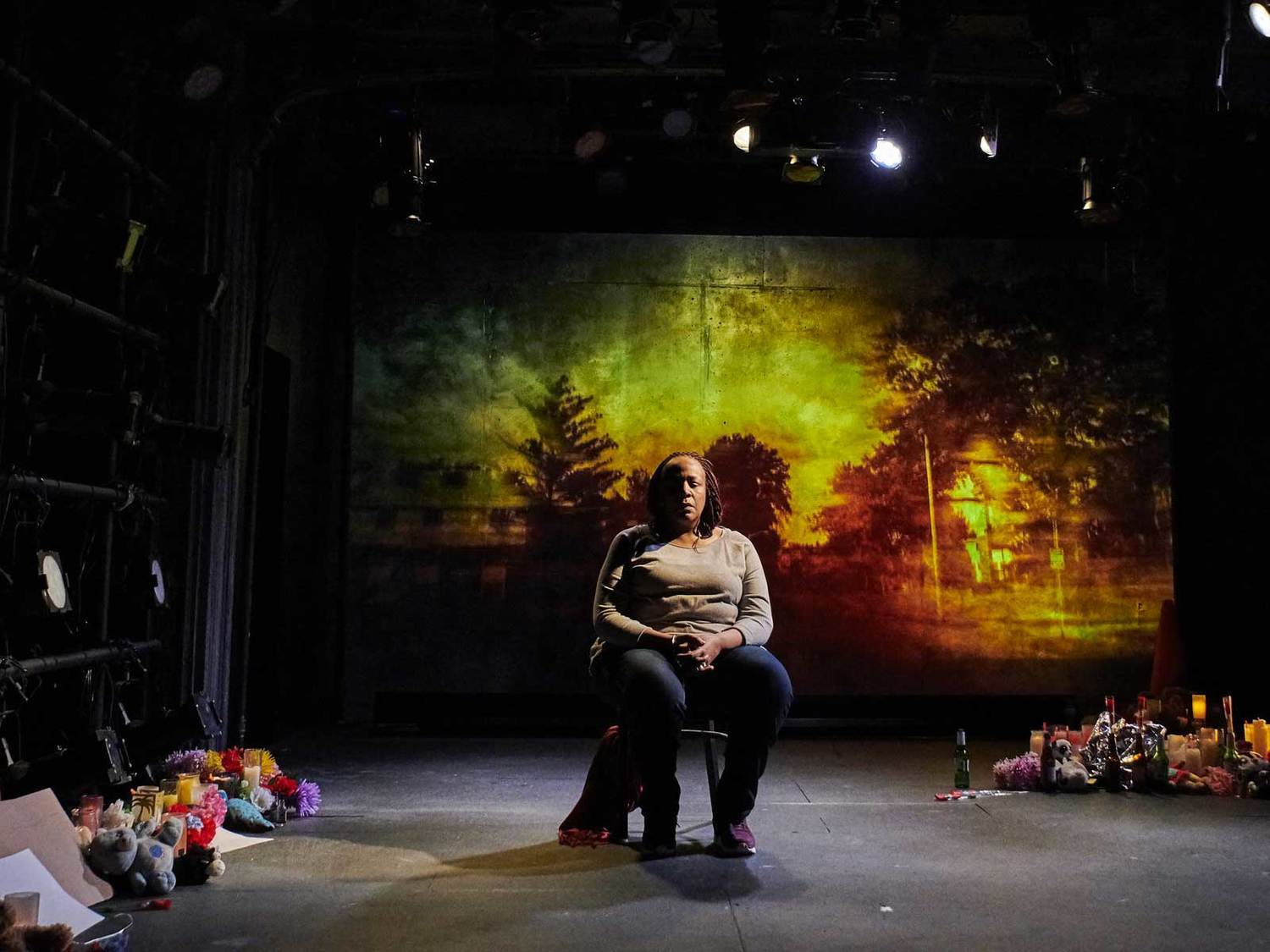Review: Intense & Searing UNTIL THE FLOOD Brings Timely Truth to the Milwaukee Repertory Theater

Ripped from the headlines. Raw emotion. Affecting stories. Diverse perspectives. The kind of stuff that makes you search your soul. That's what playwright and performer Dael Orlandersmith is bringing to the Stiemke Studio at the Milwaukee Repertory Theater with her one-woman show, Until the Flood.
The play explores some of the countless reactions of the St. Louis community to the Michael Brown shooting by Darren Wilson in Ferguson, Missouri. Orlandersmith conducted hundreds of interviews with real folks from every walk of life, then crafted those stories and varied viewpoints into one theatrcal piece. There are eight real-life characters on display in Until the Flood, and each reflects a broad range of life experiences.
There's a 70-year-old black woman who attended Michael Brown's funeral. A retired white policeman. A 60-year-old black barber who affirms, "I am not a victim." A white man, late 30s, who speaks on the topic of privilege saying, "No one ever gave me anything." A black minister named Edna, praying for love and peace. A 35-year-old white woman and high school teacher, trying to unpack how each of these young men - the shooter and the victim - got to where they are now. And finally two black young men, age 17 - one hoping to make it out of Ferguson alive, the other asking for death.
The juxtaposition of these two boys packs a real punch. One has his parents' support, black friends and white friends, and plans to attend college in California to study Art History. One afternoon, while carrying home a stack of art books, this boy was stopped by a leering, gum-chewing cop who asked him where he got the books - and how could he be sure they weren't stolen? Considering Michael Brown, the boy says: "That coulda been me." Michael Brown was also college-bound. He too, perhaps, almost made it out.
The other 17-year-old boy in Until the Flood gives Orlandersmith her most impassioned and piercing dramatic moments. This boy says he has a kind teacher at school who believes in him - and he wishes that teacher were his own father. Clearly, this boy's home life is either broken or abusive.
He talks about cruising with friends - maybe going a little too fast and playing music a little too loudly. He talks about being pulled over by a white policeman, being told to get out of the car, and staring down the cop as if daring him to pull out his gun and shoot. The boy wonders if this is how Michael Brown felt. If "Mike-Mike's" life circumstances and anger boiled up inside him and, in that moment, dared Darren Wilson to shoot. He cries and screams for his own bullet to take him out of this hopeless life.
It's tough and true theater; challenging and eye-opening. Some of the perspectives presented are downright horrifying, made all the more so because they come from a flesh-and-blood human. Others offer a glimpse of hope or an attempt to understand the bigger issues that lead to such tragic events as the shooting of Michael Brown.
As an audience member, there will undoubtedly be moments that resonate with your own beliefs, as well as moments that make you squirm. Until the Flood is a can't-miss chance to step outside of yourself, consider timely issues, and hear the stories of those folks whose paths you may otherwise never cross.
It's a chance to understand where people are coming from and how our own unique situations inform our perspectives and decisions. Any sense of hopelessness stems from somewhere and can, at times, manifest as anger of indifference - just as a hope-filled future can manifest as blind optimism.
Following each performance of Until the Flood, there is a short response from a community leader. For my night in the Stiemke Studio, the Rep welcomed the President and CEO of the Boys & Girls Club of Milwaukee, Vincent Lyles. In Lyles' riveting response, he muses that there are many times when we are all good to each other. But what about the times when we're not? "What do we do about the times we're not good to one another?" he asked.
While the answer isn't a simple one, Dael Orlandersmith's creation of Until the Flood is one shining example of what to do: Share stories and experiences, educate via art, and - hopefully - bring about some love and understanding in the process.
Reader Reviews

Videos

